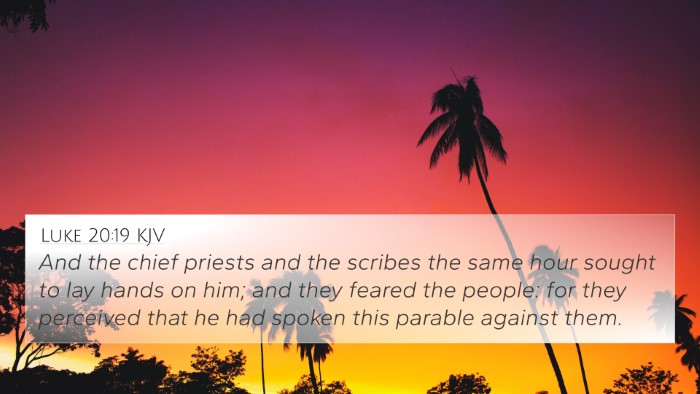Understanding Luke 19:48
Verse: Luke 19:48 - "And could not find what they might do: for all the people were very attentive to hear him."
Summary of the Verse
This verse depicts the intense interest and eagerness of the populace to hear the teachings of Jesus, contrasted against the frustration of the religious leaders who were plotting against Him. Their inability to act due to the crowd's influence highlights the significance of Jesus’ presence and message during this time in Jerusalem.
Commentary Insights
Drawing insights from the public domain commentaries, we can discern multiple layers of meaning and implications of this verse:
-
Matthew Henry's Commentary:
Henry emphasizes the contrast between Jesus' popularity and the plotting of the religious leaders who, despite their sinister intentions, were unable to act due to the overwhelming support of the crowd. This illustrates how divine truth can create a protective barrier around those who seek it earnestly.
-
Albert Barnes' Notes:
Barnes focuses on the people's attentiveness to Jesus, suggesting that their interest was born out of genuine spiritual hunger. He points out that the crowd's behavior served as a barrier for the authorities, who may have been motivated by jealousy and fear of losing their status.
-
Adam Clarke's Commentary:
Clarke notes that the phrase "could not find what they might do" indicates the confusion and desperation among the authorities. He discusses how this scene foreshadows the eventual condemnation of Jesus, as they would resort to desperate measures to silence Him.
Cross-Referencing Bible Verses
This verse connects deeply with several other Biblical texts that provide additional context and understanding:
- Matthew 21:11: The people's recognition of Jesus as a prophet as they welcomed Him into Jerusalem.
- Luke 4:22: The initial amazement of the people at Jesus' teachings and the conflict that arose thereafter.
- John 7:12: The division among the people regarding Jesus—some claiming He was good and others questioning His authority.
- Luke 23:5: The accusation that Jesus was stirring up the people, revealing the tensions between Him and the authorities.
- Acts 5:26: The apostles later facing similar crowds and tensions, showing a pattern of divine influence over the people.
- Mark 12:37: The people were delighted at Jesus' teaching, emphasizing the spiritual authority He held.
- John 12:19: The Pharisees' frustration at Jesus' growing influence and the adoration He received from the masses.
Thematic Connections
This verse is thematically connected to several topics relevant for comparative study and inter-Biblical dialogue:
- Jesus' influence over the people and the responses of Jewish authorities.
- The theme of crowd dynamics and their role in the ministry of Jesus.
- Conflict between divine ministry and religious establishment.
How to Use Cross-References for Deeper Study
Utilizing tools for Bible cross-referencing such as a Bible concordance or a Bible cross-reference guide can greatly enhance your understanding of verses like Luke 19:48. By exploring Bible verses that relate to each other and employing cross-reference Bible study techniques, one can uncover rich thematic and doctrinal connections across the scripture.
Understanding the Context
To fully appreciate Luke 19:48, one must consider the surrounding events where Jesus’ authority was frequently challenged. The tension in Jerusalem during this time was palpable, as leaders sought ways to undermine His message while the people remained captivated.
Conclusion
In analyzing this verse, we gain insight into the profound impact of Jesus' teachings and the dynamics of His ministry. The way He drew attention from the masses, despite opposition, serves as a reminder of the enduring power of truth and spiritual authority. Exploring scriptural cross-referencing and the connections between Bible verses enriches one’s understanding of these themes, exemplifying the inter-Biblical dialogue present within scripture.
Further Study Recommendations
Consider delving into the following areas for a more comprehensive understanding:
- Comparative study of the Gospels' accounts of Jesus’ interactions with the crowds.
- Examination of the role of religious authorities in the New Testament.
- Investigating Old Testament prophecies about the Messiah and their fulfillment in Jesus.








